Many sex workers, especially those who dare to be open and proud of what they do, receive hateful messages. Here, sex worker Lila Rose replies to a person who has sent her a series of messages. This was originally posted on Facebook, and is copied here with the author’s permission.
*********
Ok so some of you may know that this person has been sending me horrible and offensive messages to me because they do not agree with me being a sex worker and believe that i’m in a bad situation, even though they just assume so. Here is my response…
Dear Francesca Lilla/Maria Rosa…whatever your name is.
I have yet remained silent throughout your offensive and ignorant messages on Facebook that you have sent me regarding your opinions of my persons and of my sex work. I have remained silent up until this point because it’s not really worth my time to worry with such ignorance and criticism that is thrown my way every time it presents itself. But, seeing as you so kindly feel the need to reduce me to a victim and use your hetero-white privileged god saving complex to try to “save me” from myself as well as messaging my friends and hurling racist/xenophobic and down right disgusting comments to them, I feel the need to now educate you on my life and why I don’t give a shit about YOUR own insecurities.
So here is my response to every single message you have sent me so far:
Message ONE
Do I remember you? I vaguely remember someone by the name of Maria Rosa on my BA course at Wimbledon College of Art, if I’m not mistaken she was Italian. What happened to her? Who was she? I haven’t a clue and it’s none of my concern. Frankly, I don’t care to know either.
You discovered I’m a Sex Worker, good for you. Yes I REALLY AM A SEX WORKER and I have worked in the sex industry since I was 20/21 years old. I started escorting around a year ago now but have worked with various aspects of the industry: porn, stripping, escorting, web cam, domination, etc.
What happened to me? Lots of things have happened to me. And once again, YES I REALLY AM A SEX WORKER. I CAN’T STRESS THIS ENOUGH. What bastard told me to do sex work? This bastard right here – ME-MYSELF-AND-I. If by asking whether I am paid by someone who convinces me to do this, you actually mean that I have a pimp who “coerces” me into “prostitution” then my answer is NO. I WORK FOR MYSELF AND CHOSE TO WORK WITH ANY AGENCY THAT I’M CONNECTED WITH.
You say that there is nothing “feminist” about being a sex worker, I think you are wrong and here’s why…
For me FEMINISM is a way of life that allows me to freely act as my own agent: making the life choices that I want and dealing with them on my own terms. It’s a movement that represents all people from all walks of life, regardless of: gender, race, sexuality, class, profession, etc. And that for me includes SEX WORK. As you can see, I’m an INTERSECTIONAL FEMINIST. You can read more about it here.
By stating that being a sex worker is “non –feminist” what you are really stating is that SOME women have more validity than others, that somewhat you are superior because you believe that your way of thinking and way of life is the “right way” and any choices they have made are wrong. This to me is what I like to call: THE ANTI-WOMAN FEMINIST.
WHO MADE YOU SPOKES PERSON FOR FEMINISM WORLD-WIDE?
Here’s a nice little extract with a website you may be familiar with (Wikipedia) and their information about Sex-positive feminism (which is what I am part of):
“Pro-sex work and pro-sex worker’s rights feminists[edit]
Unlike those feminists critical of prostitution, pro-sex work perspectives do not concede that prostitution sexual acts have an inherent element of coercion, exploitation, and domination. As such, pro-sex feminists instead assert that sex-work can be a positive experience for women who have employed their autonomy to make an informed decision to engage in prostitution.
Many feminists, particularly those associated with the sex workers’ rights movement or sex-positive feminism, argue that the act of selling sex need not inherently be exploitative; but that attempts to abolish prostitution, and the attitudes that lead to such attempts, lead to an abusive climate for sex workers that must be changed. In this view, prostitution, along with other forms of sex work, can be valid choices for the women and men who engage in it. This perspective has led to the rise since the 1970s of an international sex workers’ rights movement, comprising organizations such as COYOTE, the International Prostitutes Collective, the Sex Workers Outreach Project, and other sex worker rights groups.
An important argument advanced by pro-sex work feminists such as Carol Queen highlights that all too often feminists who are critical of prostitution have failed to adequately consider the viewpoints of women who are themselves engaged in sex work, choosing instead to base their arguments in theory and outdated experiences.[39] Feminists who do not support the radical anti-prostitution view, argue that there are serious problems with the anti-prostitution position, one of which is that, according to Sarah Bromberg, “it evolves from a political theory that is over-verbalized, generalized, and too often uses stereotypical notions of what a prostitute is. The radical [anti-prostitution] feminist views are … not always delineated sufficiently to support a credible theory that prostitution degrades all women”.
Pro-sex work feminists say that the sex industry is not a “monolith”, that it is large and varied, that people are sex workers for many different reasons, and that it is unproductive to target prostitution as an institution. Instead, they believe things should be done to improve the lives of the people within the industry.”
Who told me I could be a fantastic artist? I DID. AND I AM FUCKING AWESOME.
“what the thing about being a slut?” – Honey, a slut is nothing more than a word used to reduce (predominantly) women to mere objects void of any form of agency and free will. If you allow this word to be used against you in a negative way, then you allow yourself to be reduced as such. For me, I proudly use the word SLUT. Why? BECAUSE HAVING SEX WITH LOTS OF PEOPLE IS FUN AND I ENJOY IT. AND FRANKLY, IT’S NO ONE’S BUISINESS IF I DO. IF PEOPLE ARE SCARED OF A WOMAN’S SEXUALITY THEN THAT IS THEIR PROBLEM, I AM MY OWN SEXUAL BEING AND NO ONE WILL TAKE THAT AWAY FROM ME, IT IS MY PEROGATIVE TO ENJOY SEX, TO USE IT AS I WISH AND WITH WHOM I WISH.
“I remember you were talented…” – I STILL AM TALENTED. Talent is relative and it isn’t something you can strip away because of life choices and/or other people’s opinions. I’m still doing really well in terms of art. I still make art, I exhibit a lot, I usually have around 7-8 shows a year since graduating from my art degree – and unlike you, I ACTUALLY graduated. See, I can still do both: be a sex worker and have an education…who’d have thought?!
“There is a lot of people who want to ruin feminism and make feminists sluts” – I totally agree with you: “feminists” such as yourself for example, who use their white-hetero-cis gendered privilege against those who do not fit into their system, “feminists” such as yourself who feel the need to dictate to other feminists what the “right way” is purely because they have some sort of white status. Honey, it’s “feminists” such as yourself who reduce sexually free acting women such as myself to “sluts” because you feel the need to shame them for their own agency, something you clearly don’t seem to understand. I have fought long and hard to be the free agent that I am, I have undergone extensive battles within myself, I have been shunned by my own family numerous times in order to be the free agent that I am, in order to be true to who I am. And NO ONE, NOT EVEN YOU WILL TAKE THAT AWAY FROM ME. PERIOD.
The key word here is AGENCY and I understand that you may not know what it means…here you go, educate yourself: http://www.britannica.com/…/284…/Feminist-theories-of-agency
Regarding Richard Layzell – he was my performance art tutor at art school and whilst he was influential in my way of working and communicating performance, he in no way has had any involvement in my personal life and/or life post-graduation. It is none of my concern whether or not you got on well with him at uni and maybe you should care less about rumours that other people spread and make up your own judgements of people based on your interaction with them. Richard was and is a great artist and I have the upmost respect for him, artist to artist, human to human. I don’t understand why you are even bringing him up in your already flawed arguments.
You feel bad to see me like this? DON’T. Feel bad that you are unable to mind your own business and feel the need to indulge your own narcissistic flaws by acquiring a god-complex. I pity you.
Message TWO
You say you understand that I might not want to listen to you – clearly YOU DON’T. You go on to say that I “should” listen to you and even though I had never responded you still continue to message me to make me change my mind. Once again: look at me I’m a white-hetero-cis gendered privileged feminist and you must listen to me for my way is the right way BLAH BLAH BLAH. Here’s the thing, you state that there are people who are trying to persuade me to make certain life choices and yet you are doing the EXACT thing that you claim these so called “pimps” are supposedly trying to do. It’s vile that you think you have some sort of superiority over me and therefore I must listen to your saviour complex. Well here’s some words of advice: check your privilege before you feel the need to impose your views on others and mind your own business if you are not prepared to be open minded about other people’s lives.
“if you like to fuck from different men doesn’t mean be a sex worker you can have a normal job and normal relation with men or a lot of men, or the person you like” – why, thank you for pointing out the obvious. It doesn’t mean I HAVE to be a sex worker, you are right there, but it sure does make my job a hell of a lot easier! I still have normal relations with people outside of my sex work, I can still have lots of sex with people who are not clients and guess what: I STILL ENJOY IT. I don’t want a “normal” job that doesn’t fit to my personality, this job however, does.
I find it very condescending of you to proceed to send me job applications and links, as if to assume that I am incapable of job hunting if I wish to change my job. And then, to make matters worse, you feel the need to “educate” me on how to conduct myself in interviews and in job applications. Because I have never done such things? I have worked in so many areas, in various jobs and have attended numerous interviews: I know exactly how to conduct myself in such situations and don’t need you to tell me how to do so. You seem to miss the point. I am a sex worker AND also highly educated, the two are more than capable of going hand-in-hand. And for one to assume that sex workers are an uneducated bunch emphasizes your lack of understanding on the subject matter.
Collaborating with other artists is still something I do and I create my art alongside my sex work, for me the two work alongside each other perfectly well.
“I’m really busy I cannot come to rescue you I’m so sad for that I do my best so please listen to me” – clearly you are not that busy if you have time to pester me with your anti-sex work crap. I have been busy due to being awesome, hence why I have not responded until now.
Message THREE
“I don’t know what they did to you some people they told me you are abused and you don’t remember” – First of all who are “they” and what exactly did they say to you? Whether or not I have or haven’t been abused is none of your concern nor is it any one else’s. It is up to me whether or not I reveal such information and to whom. Even if it were true, in no way is that relevant to the sex work debate, NOT EVERY SEX WORKER HAS COME FROM A LIFE OF ABUSE AND BY PROFILING THEM AS SUCH IS ANOTHER WAY OF VICTIMISING THEM WITHOUT THEIR CONSENT AS WELL AS TAKING THEIR AGENCY FROM WHAT THEY DO.
“I will save you” – Save yourself first. You clearly need it more than I do.
“I want to fucking destroy that fucking city of English bastards” – clearly your racism has gotten the best of you and you need to “check yourself, before you wreck yourself girlfriend”. Seriously, sort yourself out.
“You can have an amazing normal work having a normal life full of normal people that likes and love you as you have when I meet you” – I have an AMAZING life already, it may not be perfect but it sure has been a great learning curve and in no way would I change it. Life can always be better, but it’s what you make with it that makes it beautiful. As for the people in my life, I have plenty of amazing people who love me and who support me when I need them, and if they don’t: well, they soon loose any relevance in the story of my life. Simple.
“I can’t believe you prefer being a slut rather than have a normal job” – seriously, my job is just as normal as someone who works a 9-5 in an office, we both sell our bodies for money. I just so happen to have sex and enjoy it. And being a slut? Well: FEMINIST SLUT POWER ALL THE WAY <3
“I told you to try” – I’m telling you to mind your own business.
“I’m a feminist I risk my life for what I believe for that I’m so successful and thousands of people love me” – this is not a “who’s popular” contest. I’m glad you are successful, but guess what, so am I. You are loved by thousands of people? So am I. Who even cares?
“people don’t like slut people never like slut slut are slut these are not feminist” – well clearly you are not part of my feminism, which is fine, but keep your white collar feminism out of my grill. “sluts” as you call them, are people, they’re women, if you as a feminist can’t even see them as human beings just like every body else then for what does your feminism serve? And for whom? Get your head out of your arse.
“YOU ARE NOT A SLUT YOU ARE IN A SHIT SITUATION YOU ARE ABUSED OH GOD I CAN’T BELIEVE I’M GONNA SMASH EVERTHING IN THIS WORLD UNTIL YOU ARE SAFE WITH A NORMAL LIFE FUKIN ENGLISH MAN FUKIN EACH BASTARD OF ENGLAND THAT BRING YOU IN THAT SHIT” – Make up your damn mind. One minute I’m a slut and I shouldn’t put myself in this position the next I’m a victim and abused, blah blah blah. Do you even know what you are talking about or did you just Google up “anti-sex work feminism arguments”? Smash whatever you like, I’ll still be here: having sex, loving my life and getting paid for it. Enjoy your chaos on your own.
Message FOUR
You say you won’t calm down until I am safe in another place. I have a normal life, well as normal as one can be when you’re me ha ha. I won’t listen to you because I am acting out of my own choice and I am safe within my world. Of course one should always be cautious, whether or not you are a sex worker or a man or woman or other. I don’t need you to whisk me away to another country to stay with your family. And don’t worry, I’m constantly reflecting on my future, I don’t need you to tell me so. Yes I can go to Brazil, to Rio. I was born there and my family have a house there, I don’t need you to take me there to live with your family member. I have my own family there.
No I don’t want to meet you. You are not worthy of my time.
Message FIVE
In your opinion, sex work is the “problem for women” and that it’s “against feminism” but then you state that you are a feminist and that you “scream that women have to have their rights”, yet you fail to understand that women should have that right to choose who they and how many people they sleep with and whether or not they get paid for it. Women should have the right to be “sluts” if they choose then, surely?
Your comments about the CIA running programs to ruin feminism and that they are behind sex work is just ludicrous and I have no words to give you apart from: are you even for real?
Referring to sex workers as “prostitutes” is not only demeaning of their autonomy, it is also an out-dated term that is heavily embedded within a historical and socio-political context. Whilst it is important to understand the term “prostitute” and it’s cultural implications, one must also understand that prostitution has come a long way and we now use the term sex worker as a broader term that is more inclusive.
You say that “the system” for centuries has enslaved women and makes them passive, that “prostitutes” are never part of society, that they “never take the decisions that men in industries/politics take”, that they are “behind men”. You see, YOU ARE SO WRONG. Prostitution is the oldest profession in the books, if you really think about it, “prostitutes” were the first entrepreneurs and still are. You say they are passive, but really most are not, and I know many! You seem to assume that all working girls are in fact victims and can’t take care of themselves. And I assure you I am the LEAST passive person you will ever find, yet I still am a working girl. Do you even know any sex workers personally? Have you even engaged with any? Have you taken the time to find out about their lives, about how they operate, how they feel before casting judgements?
And yes I am behind men quite a lot, usually with my dick in their arse. It’s so much fun, you should try it some time.
“oh god the other day I thought that if you know what I am doing with feminism how you would look at me” – So what, you want a fucking medal?! I do as much within feminism myself and I am a proactive speaker through my art work as well as social media, I go to protests, to marches, to rallies.
“Oh I thought also what you might didn’t listen to me that you mike think I’m lesbian, I’m straight I have a boyfriend” – well first of all, your sexuality and sexual preferences aren’t of any interest to me and even if you were a lesbian, it would have nothing to do with me listening to you or not. I myself am pansexual, I am attracted to various people of various genders and sexualities. I’m LGBTQ friendly.
“if I am a feminist, if I know a person is in a bad situation if I don’t help what kind of feminism I speak for?” – But you don’t know whether I am in a bad situation or not…you just ASSUMED so purely based on the fact that I am a sex worker. That is all. You haven’t even asked if I’m ok, if I’m enjoying myself, if I like my work.
“I’m an activist, I have passed a lot of bad things for what I’m doing and I continue for make real the dream that women have decades ago even if it is difficult” – well I’m glad that you are passionate about your activism but ask yourself this: for whom am I doing it for? I’m also an activist, I can be a sex worker AND an activist: SHOCK HORROR! And may I add that what feminists fought for decades ago isn’t necessarily viable in this day and age. Society has moved on and we have other worries and other fights to fight. It’s not just about women any more, I can’t stress this enough. Yes women still feel the brunt of things, yes women still suffer inequalities, but so do other people and in order to achieve any sort of equality then surely everyone must fight along side each other?
Message SIX
You want me to explain to you why I continue being a sex worker: because I enjoy having sex and getting paid for it, whether that be through escorting, through my porn work or web cam. I get paid a better wage than most people dream of and it allows me time and flexibility with art making. By being paid well, it means that I am able to fund my main career as an artist. Because I meet so many different people from all walks of live, not all men, some times women. I have met so many wonderful people who respect me and treat me well.
Don’t get me wrong, there are bad days and there are times when you feel like you don’t like it, but then isn’t that the same with most jobs? Don’t most people feel that way about their jobs? It’s been a learning curve more importantly, and I relish in the fact that I’m a very strong person and that my feminism has informed my sex work. I have opened up strong communications with my clients, who know that I’m an artist and an activist, who support what I stand for, and for that it makes me more determined in my role as a service provider.
No, I haven’t listened to you because I do not share your opinions, your values and I most certainly do not appreciate your accusatory tone with which you have approached me. It is one thing to express your opinion on the subject matter, another to demand that I change my life for you simply because you fail to understand my life and feminism. I think it’s time to end this tiresome port of communication, don’t you? I will not respond to anything else you have to say for I have said all that I needed to say.
<3 FEMINIST SLUT POWER <3
From your dearest slut…
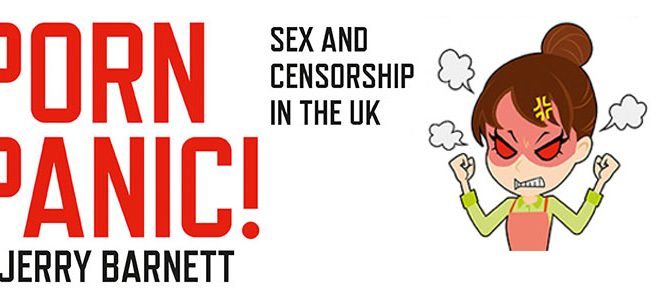

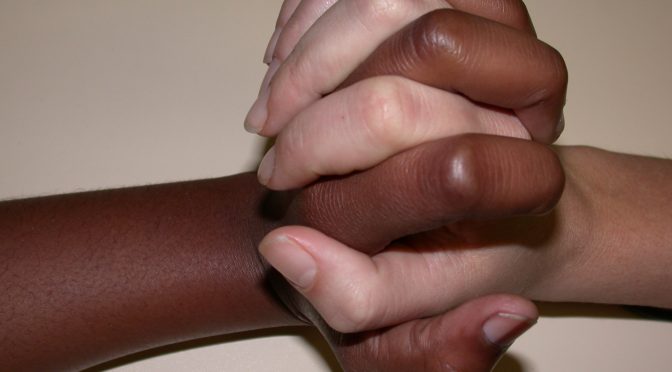
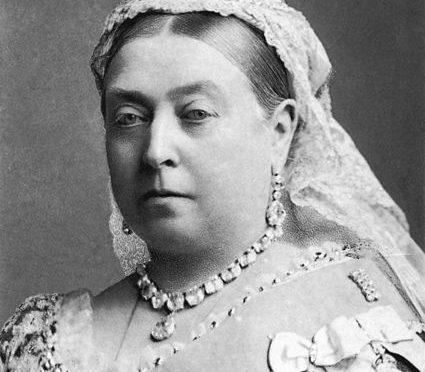

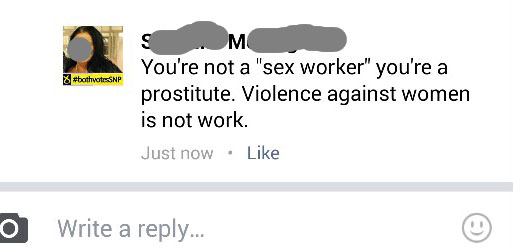
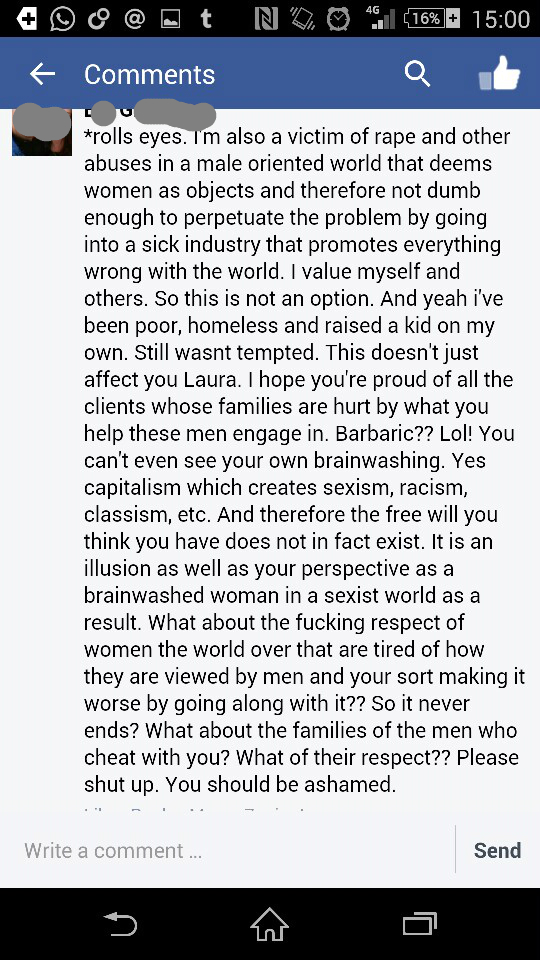
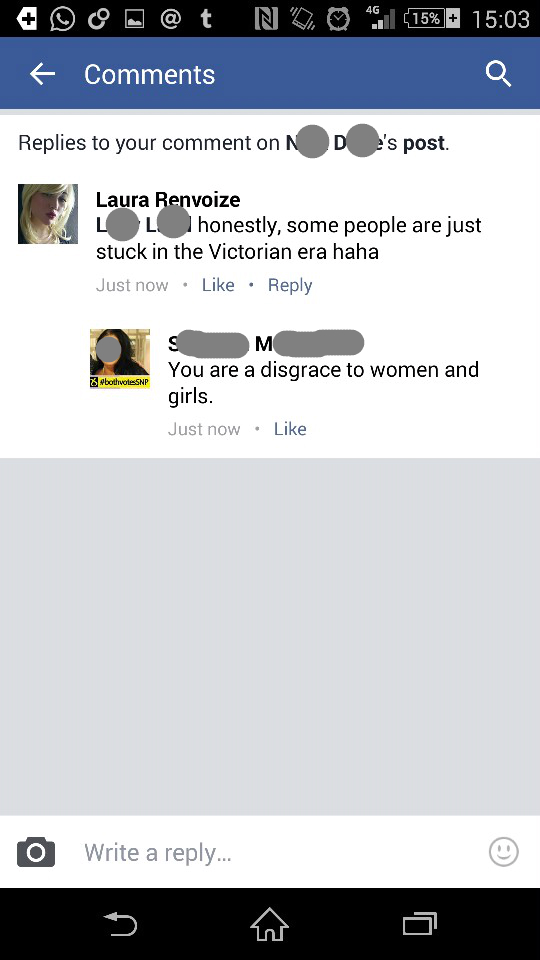
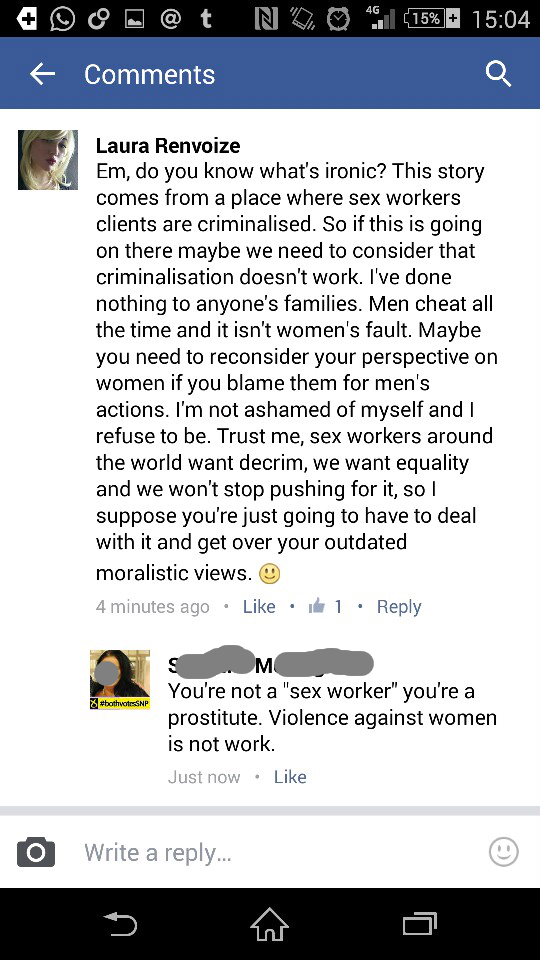

 A couple of years ago, as I was launching this campaign, I was contacted by Vanessa Pellegrin, who was working on a documentary called The Trouble With the F Word: a film examining why feminism has become so unpopular. She has now launched a
A couple of years ago, as I was launching this campaign, I was contacted by Vanessa Pellegrin, who was working on a documentary called The Trouble With the F Word: a film examining why feminism has become so unpopular. She has now launched a 
